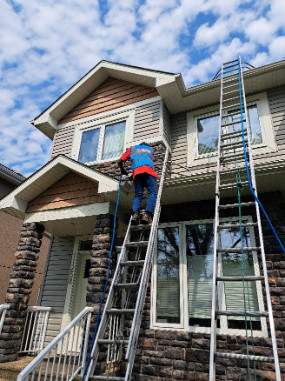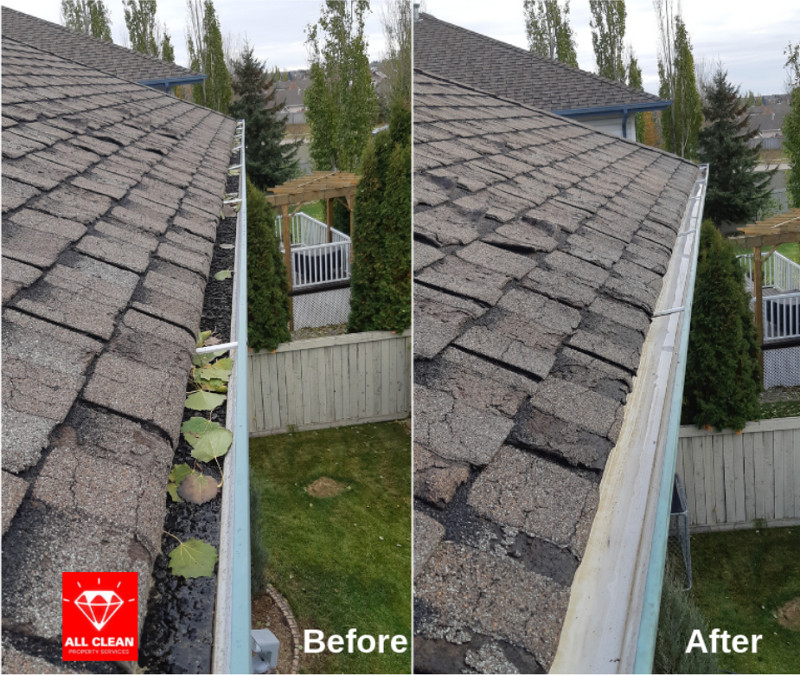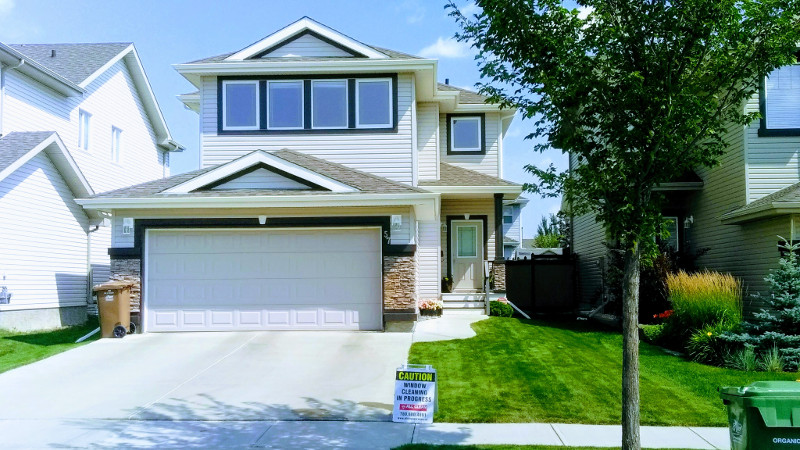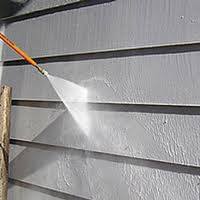The primary purpose of a gutter is to collect rainwater from the roof of a building and channel it away from the foundation of the structure. By directing water away from the foundation, gutters help prevent water damage, such as erosion, flooding, and structural issues, which can arise when water accumulates near the base of a building.

Gutter Cleaning St Albert
Additionally, gutters help protect the exterior walls, windows, doors, and landscaping from water damage by controlling the flow of rainwater.
Therefore, when your gutters are leaking, it defeats the purpose for why they were installed.
What are leaky gutters?
Leaky gutters occur when there are gaps, cracks, or holes in the gutter system, allowing rainwater to escape rather than being properly directed away from the building. Leaks in gutters can lead to a range of problems, including water damage to the building's exterior, foundation, and landscaping. Additionally, leaks can contribute to the growth of mold and mildew and create slippery surfaces around the property. It's important to address leaky gutters promptly to prevent further damage and maintain the integrity of the building's structure. This may involve repairing or replacing damaged sections of the gutter system to ensure effective water drainage. Regular maintenance, such as cleaning gutters and checking for signs of damage, can help prevent leaks and prolong the lifespan of the gutter system.
What causes leaky gutters?
Leaky gutters can be caused by various factors, including:
Damage: Physical damage to gutters, such as dents, cracks, or holes, can occur due to factors like falling branches, debris impact, or harsh weather conditions like hailstorms. Over time, this damage can lead to leaks.
Clogs: When gutters become clogged with leaves, twigs, dirt, or other debris, water can overflow, putting pressure on the gutter seams and joints. This pressure can cause the gutters to develop leaks over time.
Corrosion: Exposure to moisture, especially if the gutter material is susceptible to rust or corrosion, can weaken the gutter structure and lead to leaks. This is particularly common in older metal gutter systems.
Poor Installation: Improperly installed gutters may not have the correct slope or may not be securely fastened to the fascia board. This can result in water pooling in certain areas, putting excess strain on the gutters and causing leaks.
Freezing and Thawing: In regions with cold climates, water trapped in gutters can freeze during winter months. The expansion of frozen water can cause gutters to warp, crack, or detach from the structure, leading to leaks when the ice thaws.
Settling: Over time, the foundation of a building may settle or shift, causing the gutters to become misaligned or lose their original pitch. This can prevent water from flowing properly and may contribute to leaks.
How to solve leaky gutters
To solve leaky gutters, you can follow these steps:
Clean Gutters: Remove any debris, leaves, or other obstructions from the gutters and downspouts. This ensures that water can flow freely through the system, reducing the risk of overflow and leaks.
Inspect for Damage: Check the gutters for signs of damage, such as cracks, holes, or rust spots. Pay close attention to seams, joints, and connections where leaks are most likely to occur.
Repair Damage: Depending on the extent of the damage, you may need to repair or replace sections of the gutter system. Small cracks or holes can often be patched with gutter sealant or metal patches, while larger damage may require replacing entire sections of gutter.
Realign Gutters: Ensure that the gutters are properly aligned and have the correct slope to allow water to flow toward the downspouts. Use a level to check for proper alignment and adjust the gutter hangers or brackets as needed.
Seal Seams and Joints: Apply gutter sealant or silicone caulking to seal any seams or joints where leaks are occurring. This helps to create a watertight seal and prevent future leaks.
Install Gutter Guards: Consider installing gutter guards or leaf screens to prevent debris from entering the gutters and causing clogs. This can help reduce the need for frequent gutter cleaning and minimize the risk of leaks.
Check Downspouts: Ensure that downspouts are clear and properly connected to the gutter system. Redirect downspouts away from the foundation of the building to prevent water from pooling near the structure.
Regular Maintenance: Schedule regular inspections and maintenance to keep your gutters in good condition. Clean gutters at least twice a year, or more often if you live in an area with heavy foliage or frequent storms.
By following these steps and staying proactive with gutter maintenance, you can effectively solve leaky gutter problems and protect your home from water damage. If you're not comfortable performing these tasks yourself, consider hiring a professional gutter cleaning and repair service to ensure the job is done correctly.
Related Articles
How much does it cost to clean all windows in a house in Edmonton, Alberta?
Residential Window Cleaning in Edmonton








 Receive notification when new post is published:
Receive notification when new post is published:
